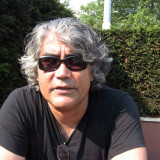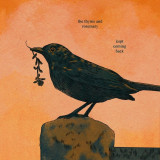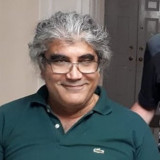(where philosophy and poetry meet)
-
ddavidd
6 months agoSince nobody uses this platform, I figured I could talk to myself here and share some of my thoughts with myself through it.
Marx took the Hegelian dialectic and pressed it flat—pregelatinized—into a dialectic of matter alone. In that compression, he lost the shimmer of its twin nature. For matter and metaphysical are not strangers; they are opposite siblings—bound together in a quarrel so ancient that neither can live entirely with, nor entirely without, the other.
Take the knowledge of sequence. Kant calls mathematics synthetic a priori—yet it is also empirical, for sequence is not only an invention of the mind but a pulse we find in the world itself. We encounter it in the turning of planets, in the rhythm of breath, in the unfolding of a thought.
We are creatures who can see likeness in the unalike, who can name patterns and make them into words. And so this knowledge of sequence moves in two currents: one centripetal, spiraling inward toward the structures of mind; the other centrifugal, spiraling outward into the fabric of reality.
It is both the seed and the soil—internal and external—meeting at the living point where perception touches what is. This is the unity the dialectic was born to hold, and the unity we forget when we sever one twin from the other. -
ddavidd
6 months ago
My criticism of Marx and Kant is double-edged: physics and metaphysics cannot exist without each other, like mountains and valleys. Even as a master of dialectic, Marx was limited by his historical moment and the rapid expansion of science; he failed to apply dialectic fully to its own (dialectic)subject. This limitation was one of time, not of genius. -
ddavidd
5 months ago, updated 5 months agoA friend of mine quoted me, “ I’m glad your life is so full and busy. I believe that’s how it should be—leaving no room for slack or self-doubt.”
and responded: "there’s always room for self doubt."
Then me:
There is always room for self-doubt,yet only within its proper margin. Things exist because they are necessary; it is when we extend them beyond their natural bounds, more or less, that corruption begins. Even stealing and killing have their margins. To live is to learn these limits, and without them, even a butterfly could not exist. Its flight depends on the delicate balance of wings, a dialectic both understood and embodied, sustaining parity as it passes through the jagged obstacles of the world. For insects and animals, such transitions are instinctive. They do not think about balance; they are balance. But for human beings, instinct must be earned earned instead of instinctively owned. We must first comprehend before we can recover what must feel natural. The gap between the impulse we fill with knowledg, that is what we call consciousness. I tried to speak of this, to teach it, though few were willing even to hear, let alone to understand. Yet I knew within myself that there was a reason, because here was where I wanted to release them,and that was my reason. . Here we return to philosophy. Human beings must earn their instincts. We go beyond the flesh, seeking to merge with the very yearning we once cast into gods. For man cannot remain balanced on his own, neither gravity nor his own hands can hold him steady. Angels may be born godly, carrying their divinity without effort, but man must become godly. His equilibrium is not given; it is tailored, ceaselessly, in the flow of time. Perhaps this is a curse, perhaps a blessing, but it seems the very chariot by which man may rise to God. After the fruit was bitten, God declared: He has partaken of knowledge. From that moment, humanity’s task was set. Knowledge became our burden and our purpose. For knowledge belongs to man alone. In heaven and in earth, it has no use, save for God Himself. Yet therein lies a paradox: if God requires knowledge, then He cannot be omnipotent. Perhaps this is why we imagine hierarchies of gods, a pyramid of divinity. But such visions do not undo the oneness of God. At a certain height, the pyramid converges to a single point. And in that point, distinctions dissolve: there is no this or that, no here or there, no me or you. No arrow, no pyramid, no triangle. All forms vanish into omnipresence, the tightest place, yet the most spacious; a presence without space, a spaceless presence. This is the irony of enlightenment. The vertex of the pyramid, after all the striving, reaches the point. But at the very instant of achievement, the point ceases. The base folds upon itself, dimensions collapse, and time dissolves into silence. All pursuit was toward the point, yet the point itself disappears. A beautiful irony: the ceasing of the point becomes the fulfillment of its purpose. -
Sunshine replied to ddavidd
5 months ago, updated 5 months agowhat I take from what you wrote is that balance itself is never a finished thing...it’s always being earned and re-earned. I liked the image of the butterfly, and how even something so delicate depends on its limits to survive. Maybe that’s why both doubt and knowledge feel necessary: one keeps us from floating away, the other keeps us from sinking. Reading your words, it feels like you’re describing that constant pull between the two..
Thinking of it more without expansion, maybe it makes sense that Marx, being so rooted in his own time, would end up flattening the dialectic instead of letting both sides breathe. Your point about sequence being both in us and around us feels true… like we’re always standing right at that meeting point. -
ddavidd replied to Sunshine
5 months ago, updated 5 months agoEverything you said is true. Your interpretation was indeed your own, yet it did not distort my thought in any way~there was no misreading. That, in fact, is the best outcome: when one can express something in their own words, it means they have come closer. One truly understands only when one can translate an idea into their own language.
That said, you did not touch on everything I emphasized. You were captivated by balance. And no wonder: you and Abby are the most balanced people I know. You cannot imagine how she finds balance in everything; she is a social butterfly in an entirely different sense.
You are very intelligent. Please don’t think I’m offering mere courtesy; I’m simply describing what I see. Perhaps you are unaware of it, or perhaps you conceal it well.
<>
The dualism you noticed is like a wing, it gives us flight, teaching us how to move with the flow. It is stillness divided into waves, into equal measures of rise and fall, omnipresence broken into time.
The point I was referring to is God: where we come from, and the period, the full stop at the end of our life-sentence, the line of endless, dimensionless points. Or better: a point in motion that appears as all points, like the eternal Now, a point that holds everything and yet has no volume at all.
That is why idolatry was the first religion. They knew of the Point in the beginning, the absolute silence, the absolute stillness against which all else is motion. And what could embody it better than stone, the most unmoving of objects?
Yet the stillness of God~the Point itself~is so profound that no living being can gaze upon it and survive. For awareness, or consciousness, arises only from motion. Hence the condemnation for tasting the forbidden fruit: the shift from immediate knowing to fragmented comprehension, from unity to individuality, from wholeness to partial glimpses of the collective, colective which is itself nothing but the Point, the sum of nothingness and everything.
I’ll stop here, lest I make this too long. -
BOB GALLO
5 months ago, updated 5 months agoHilarious:
https://www.facebook.com/watch/?v=1115217130672430&rdid=yyKEJE9wcbMIk9Mn
This man sees the “Nothing” as I described—point, zero, even now—and yet he arrives at the opposite conclusion. His reasoning is brilliant, yes, but brilliant only within the narrow lattice of Formal Logic, not within the living current of the Dialectical.
What he does not grasp is the necessity of the twin couplets: nothing and everything, zero and infinity, finite and infinite, stillness and motion, ever and never, now and time—point and line. None of these exist without their counterpart. They stand as light to darkness, good to bad, mountain to valley. One cannot be comprehended without the other. Darkness cannot be seen in darkness alone; it reveals itself only against light. Stillness is understood only in motion, and motion only against stillness. Good can be measured only in the presence of bad.
So nothingness itself, when spoken here, exists only through its own denial. It becomes the disproval of itself. Thus, what seems to be the disproof of God in Formal Logic is, within Dialectical Logic, the very proof of God. For how can a mountain exist without valleying itself in reverse?
This marriage of opposites—the finite and the infinite, the mountain and the hollow—was first glimpsed by Descartes in his Meditations. I have only carried it further, toward the roots of religion itself, to discover why faith began with stone idolatry: the eternal face carved in matter, where absence and presence conspire in a single form.
Stone, because it is the nearest image to absolute stillness in physical form. -
BOB GALLO
5 months ago.... Stone is the nearest image of absolute stillness—God—timeless and eternal. It is a stillness so complete that everything else, by comparison, is motion; a stillness so perfect that it becomes the source of motion itself, for every other stillness is only partial before it. Stone endures beyond the flux of water, wind, and fire, bearing witness to ages without itself appearing to change.
In this stillness, early humans discerned permanence; in permanence, they saw eternity; and in eternity, they glimpsed divinity. Their minds, not yet fractured by the restless motions of thought, were closer to infinity. These glimpses, as Descartes would later suggest, arise precisely because of our finitude.
To carve a face into stone was therefore not mere decoration but ritual act—an advanced comprehension of the law of opposites: presence within absence, voice within silence, motion within stillness. The stone idol was at once mute and speaking, lifeless and eternal. It gave form to the paradox of the divine: an object that negated its own objecthood, absolute stillness vibrating with infinite life.
The first idols were not mistakes of primitive religion but necessary steps in humanity’s recognition of the Absolute. They were not false gods; in some sense, they were even more advanced than later religions, for they offered the most direct and natural glimpse of the eternal. They stood as mirrors of a deeper truth: that every nothing conceals an everything, and every silence resounds with a hidden word.


